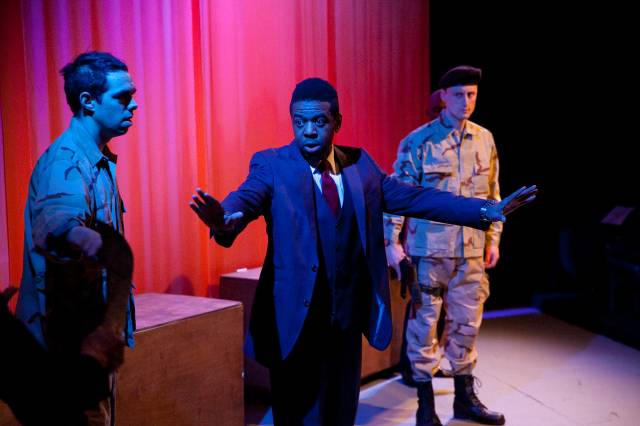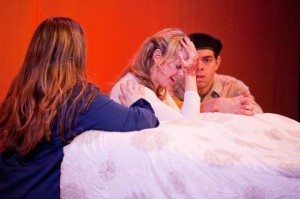

The first page of the Seeing Place’s program for Othello, the opening play of their sixth season, states: “Othello is not just a ‘black’ play…it relates to all of us today, particularly in our current climate of strained Arab-American relations.” What I expected, therefore, was a play about the politics of identity, wrapped up in issues of race and religion. Instead, what I found unfolding on stage was an experiment in storytelling and a distinct artistic process.
At the center of the play, where this is most apparent, is Iago, played by Brandon Walker, who has also co-directed the work with Erin Cronican, who plays Desdemona. Walker’s Iago literally makes the play happen. He exposes his plan with grit and determination in verse and in the manipulation of the set, putting together and taking apart two large wooden boxes that act as desks, bars, and the fatal bed. Cronican plays her own part with a similar self-assuredness, pulling and pushing at Othello (Ian Moses Eaton) and Cassio. Logan Keeler, who plays Cassio, receives special mention here for exuding a dynamism that Desdemona might be attracted to, while still grounding himself in the scene where he almost drunkenly slays another soldier. In one of the best scenes of the play, where before the arrival of Othello, much of the group waits, Iago recites the verse with his guitar, interrupted by Desdemona at junctures as if they were prompts to aid the creation of an impromptu song. Cronican and Walker are in full command here, and it forces the audience to listen to the verse.

But many of the lines in the play receive no such special treatment. Instead, they are huddled between the banging of glasses, the stomping of shoes and the brandishing of weapons. The actors are constantly moving, grunting, moaning and laughing, deconstructing the verse as if to say this is not a song we will sing together, but take apart in new ways. When Othello has been undone, we see him at a loss of words, literally. Ian Moses Eaton sacrifices the verse, as if emotionally unable to come to it. Lines are heard and lost as he breaks down.
All of this makes sense in the contemporary world we are in, where we are most often at a loss for words, talking over each other instead of listening to each other, where the noise of our everyday lives does drown the notes of our own speech. But I was left wondering – why is Othello as Muslim only hinted at before he kills his wife, how can we come to feel his otherness without emphasis on the text and finally - why choose Shakespeare at all, for he demands in us a temperance and clarity which has gone amiss in the world.
I left the production thinking anew about Shakespeare in general, for often his words turn into repeated fables and it is a dare indeed to do something new with it.